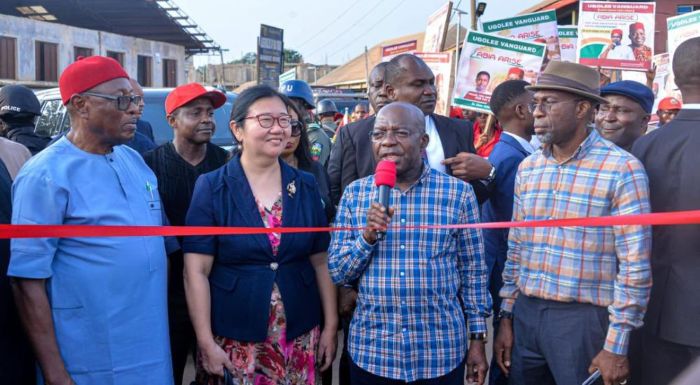Otti Explains Delay in 200 PHC Project, Sets Broader Health and Education Overhaul in Motion

Abia State Governor, Dr. Alex Otti, has explained why his administration missed its ambitious four-month deadline to complete the rehabilitation of 200 Primary Healthcare Centres (PHCs) under the “Project Ekwueme” initiative.
Speaking during his monthly media chat in Umuahia, Otti said the timeline was extended after his team decided to add residential accommodations for health workers at each centre, a move designed to guarantee 24-hour service delivery across all wards in the state.
So far, the project has covered five local government areas, with 120 PHCs fully rehabilitated. “The decision to provide staff quarters was deliberate. Healthcare must be accessible around the clock, and without accommodations, this would have been impossible,” the Governor explained.
Upgrading General Hospitals for Specialist Care
Beyond PHCs, the government is expanding its hospital upgrade drive:
- Obingwa General Hospital is nearing completion.
- Abayi Aba Cottage Hospital is ready for commissioning.
- Umunnato General Hospital is being transformed into a Specialist Hospital.
- Amachara, Okpu-ala Ngwa, Ukwa, Ohafia, and Arochukwu General Hospitals are undergoing rehabilitation.
To support this, Otti has approved the recruitment of 771 health professionals, with over 1,200 shortlisted for screening out of more than 2,000 applicants. He also revealed plans to hire specialist consultants through the Civil Service Commission to strengthen hospital efficiency.
Meanwhile, the Abia State Health Insurance Agency (ABSHIA) has already enrolled 101,000 residents, broadening access to affordable care.
Education Reform: From Smart Schools to Higher Learning
Governor Otti also highlighted progress in education reform, noting that:
- One Smart School is complete in Umuahia, while 61 others are at various stages.
- 221 schools (170 primary and 51 secondary) are being rehabilitated.
- Over 5,394 teachers have been employed, with postings across LGAs to absorb pressure from free education enrolments.
At the tertiary level:
- Ogbonnaya Onu Polytechnic, Aba, recently attracted a ₦2 billion TETFUND High Impact grant, the only South-East institution to do so. With a new permanent site under construction, Otti says the school will introduce AI, Robotics, Science and Technology courses within two years.
- Abia State College of Education is undergoing infrastructure rehabilitation, from lecture theatres to electricity upgrades.
- Abia State University, Uturu, is also receiving major investments — from hostel and faculty upgrades to the installation of a 15-megawatt power turbine for energy independence.
The Bigger Picture: Infrastructure, Energy, and Youth Empowerment
Complementing health and education, the Otti administration is also tackling:
- Roads: 50 under direct labour, 30 under contract.
- Electricity: Plans to buy out Umuahia and neighbouring LGAs from Enugu Disco, while expanding solar-powered street lighting for safety and nightlife economy.
- Youth Empowerment: Moving away from cash handouts toward talent incubation programmes such as the Youth Talent Hunt, Youth Leadership Academy, TechRise, Ethnocentrique Fashion, and cooperative financing.
BRANDECONOMY Insight: Health at the Core of Development
From a health economics perspective, the decision to add residential quarters to every PHC is transformational. Around-the-clock access enhances maternal and child care, reduces preventable mortality, and builds community trust in public health.
Coupled with the expansion of specialist hospitals and an insurance-backed access framework, Abia is laying the foundation for a sustainable healthcare ecosystem that can support its wider education, energy, and industrialisation agenda.
In economic terms, the reforms can trigger a multiplier effect: healthier populations mean higher productivity, better student outcomes, and stronger investor confidence.
Bottom Line:
Governor Otti’s health sector delay is strategic rather than symptomatic. By embedding 24/7 service capacity into PHCs, reinforcing general hospitals, and linking reforms to education and infrastructure, Abia is modelling a holistic development blueprint that ties health to human capital, and human capital to long-term prosperity.












